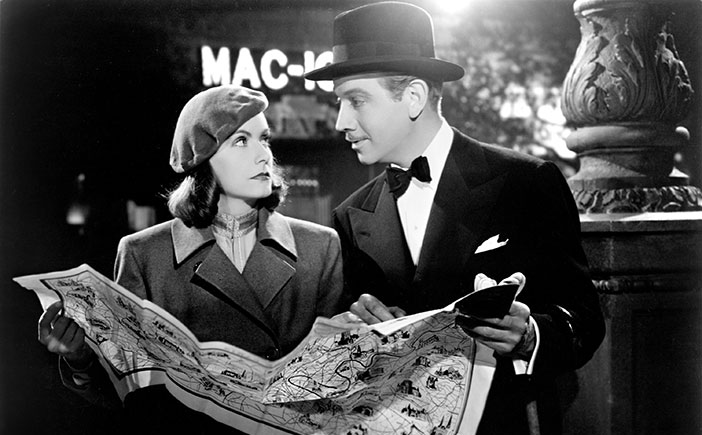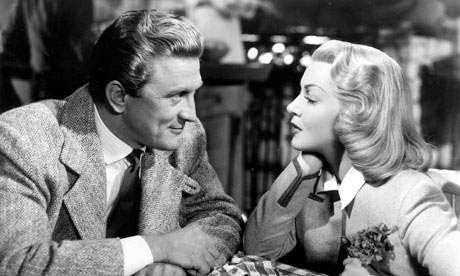#256 - Ninotchka
Ernst Lubitsch, 1939

A Russian diplomat is sent to Paris as part of a mission to located some jewelry.
Ninotchka marks the first Greta Garbo film I've actually seen. Here her presence as the titular Russian diplomat marks her all-too-brief foray into comedy, which is a shame because her role as a comically serious Russian sent to retrieve both a set of confiscated Russian jewelry and the trio of comrades originally sent to retrieve said jewelry before being seduced by lavish Western society. Her foil in this case is a French count (Melvyn Douglas) who becomes intrigued by her cold resistance to the upper-class temptations of Paris. Though it doesn't truly pick up until Ninotchka herself arrives, which does take a while, but it does pick up considerably. Garbo's chilly sarcasm definitely makes an impression as she gets very sarcastic with Douglas and a cavalcade of characters throughout the film. Though the film does lose a little of its comedic momentum as Garbo rather predictably warms up to Douglas and learns to embrace the fun side of decadent European attitudes, it does still manage to keep up a compelling narrative with some likeable characters (Garbo is always amusing, but Douglas takes a while to grow on you).
Beyond the obvious reliance on a classic rom-com's set-up and interplay, there are some interesting gags involving the divide between the joyless yet egalitarian attitudes of communist Russia and the pleasurable yet uneven freedoms of Western Europe - though the film does play up the strengths and weaknesses of both sides of the issue, given the fact that it's a Hollywood film from 1939 it should come as no surprise which side the film ultimately comes down on. Potential political squabbles aside, Ninotchka is a rather strong example of a screwball comedy that has quite a few good one-liners, solid lead performances, and a surprising level of depth. It's definitely a worthwhile example of a classic comedy that, though far from perfect, holds up rather well even now.
Ernst Lubitsch, 1939

A Russian diplomat is sent to Paris as part of a mission to located some jewelry.
Ninotchka marks the first Greta Garbo film I've actually seen. Here her presence as the titular Russian diplomat marks her all-too-brief foray into comedy, which is a shame because her role as a comically serious Russian sent to retrieve both a set of confiscated Russian jewelry and the trio of comrades originally sent to retrieve said jewelry before being seduced by lavish Western society. Her foil in this case is a French count (Melvyn Douglas) who becomes intrigued by her cold resistance to the upper-class temptations of Paris. Though it doesn't truly pick up until Ninotchka herself arrives, which does take a while, but it does pick up considerably. Garbo's chilly sarcasm definitely makes an impression as she gets very sarcastic with Douglas and a cavalcade of characters throughout the film. Though the film does lose a little of its comedic momentum as Garbo rather predictably warms up to Douglas and learns to embrace the fun side of decadent European attitudes, it does still manage to keep up a compelling narrative with some likeable characters (Garbo is always amusing, but Douglas takes a while to grow on you).
Beyond the obvious reliance on a classic rom-com's set-up and interplay, there are some interesting gags involving the divide between the joyless yet egalitarian attitudes of communist Russia and the pleasurable yet uneven freedoms of Western Europe - though the film does play up the strengths and weaknesses of both sides of the issue, given the fact that it's a Hollywood film from 1939 it should come as no surprise which side the film ultimately comes down on. Potential political squabbles aside, Ninotchka is a rather strong example of a screwball comedy that has quite a few good one-liners, solid lead performances, and a surprising level of depth. It's definitely a worthwhile example of a classic comedy that, though far from perfect, holds up rather well even now.
__________________
Iro's Top 100 Movies v3.0
I really just want you all angry and confused the whole time.









